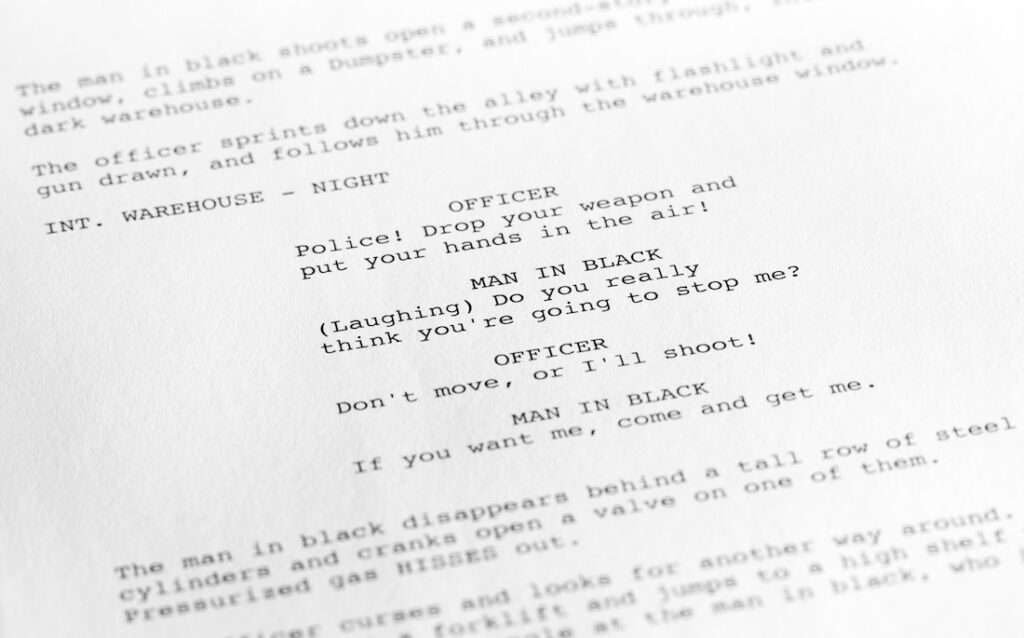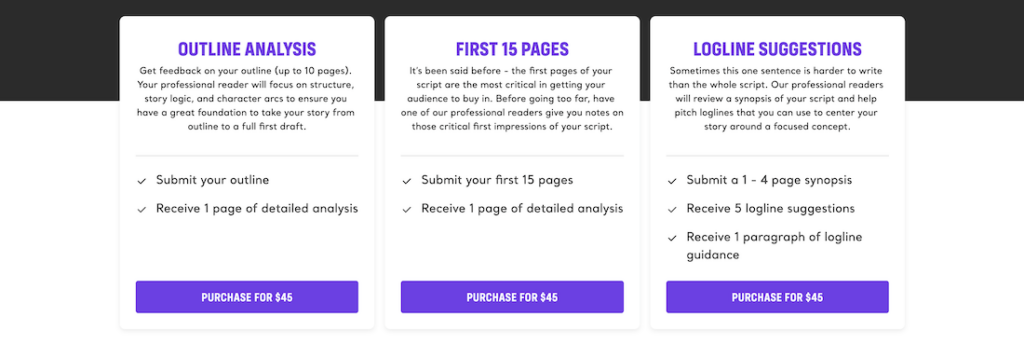If you’re a screenwriter, the new year is like a fresh canvas for you to evolve and level up in your craft and career. And that is what you always need to be doing as a screenwriter — evolving and advancing your skillset, experience, and screenwriting goals.
Whether it is during the advent of a new year or after certain initial goals in your screenwriting have been met, there comes a time when you need to take a look at yourself in the mirror and ask questions like:
- Where can you up your game?
- How can you add a dash of originality to your scripts?
- Are there any new marketing tricks up your sleeve?
- What nuggets of wisdom have you picked up from past years — and how can you apply them to your screenwriting craft?
- What new screenwriting goals are you going to strive for?
Here we present seven (lucky seven!) screenwriting goals that all screenwriters can strive for as they struggle and strive to grow as a writer and make substantive advances in their screening journey and career.
Take a Year Off of Marketing Scripts to Write More
Most beginning screenwriters focus too much on making that first sale with their first or second screenplays. The hard truth is that it can take years and numerous scripts to get to a point where you are ready for the big leagues as far as selling a script or using your scripts to get hired for a major paid writing assignment.
Put more emphasis on honing your skills. We all want success, and we want it fast. But what will help you obtain success faster in your career is honing your skills, making the mistakes you need to make, learning from those mistakes, and applying those lessons to the next script, and the next script, and the next script.
One script isn’t going to get you representation. You need to do your best to stack your deck with a collection of well-conceived and well-written scripts that stand out.

Learn How to Write as Fast as a Pro
If you’re going to set a goal to write more, you need to also learn how to write as fast as a professional screenwriter. The days of taking anywhere from six months to a year or beyond to get to a final draft of a single screenplay need to be over. That’s not how long pro screenwriters are given while under paid contract. And if you want to be a pro, you’re going to need to learn how to write like one.
Most Hollywood screenwriting contracts give the screenwriter anywhere from one to two months (tops) to finish a first draft. And when you’re under contract, that first draft needs to be as good as a final draft — or else you get replaced.
The rewriting phase as a pro is even more swift. You generally have a couple of weeks to take the notes from the studio, network, producers, and director and apply them to a second draft.
So, as a pro, you have to learn to write fast. And the writing has to be spectacular in that time frame. You can’t just write a vomit draft and expect to be retained for the remainder of the contract without being replaced.
Make a goal to learn how to write a script within a month or two. Before you decry that this is an impossible feat because of family duties, school, or current bill-paying career, understand that writing fast is actually pretty easy.
Once you learn how to do that, you’ll be able to truly write more within a calendar year.
Read More: The 10-Day Screenwriting Solution: How to Write Lightning Fast

Write in a Genre You’ve Never Written in Before
If you want to evolve and grow as a writer, you need to challenge yourself. While it’s nice to have that niche genre strength, you’re going to also need to learn how to adapt and take on multiple genres in your screenwriting career. Writing in a new genre will also help you discover strengths you didn’t know you had.
Hollywood is also all about genre-blending.
Read More: The Power of Genre-Blending Screenplays
If you have strength writing in a certain genre, you can apply to one that is most desirable during any given trend that is hot and most desirable in the eyes of the studios, networks, and streamers.
- If you’re known for writing great drama, apply that to a comedy to create a stand-out dramedy.
- If you have a knack for writing horror, try to blend that with a period piece or science fiction world.
- If you love writing in the action genre, see if you can pair that up with a good comedic concept to create a crowd-pleasing action comedy.
There will be no greater learning experience than tackling something that you’re not used to doing.
Tackle the Script You’ve Always Wanted to Write but Were too Scared to Take On
Everyone has that one script or concept that they’ve kept pushing to the back of their brain because it’s too intimidating to take on.
- It’s going to take too much research.
- You don’t know how big or small the story should be.
- You can’t find the angle you want to take.
- It’s too big of a world.
- It’s too niche and you’re scared Hollywood won’t want it.
 Whatever the reasons for your fears may be, it’s time to throw caution to the wind and just go write it. Listen to the whispers in your life. If you are constantly coming back to a certain story, concept, visual, or gimmick you want to explore, listen to those whispers and go write it. Ignore the other whispers telling you not to. Those are just manifestations of your insecurities and fear — your survival instincts trying to help you take the easiest and least risky path.
Whatever the reasons for your fears may be, it’s time to throw caution to the wind and just go write it. Listen to the whispers in your life. If you are constantly coming back to a certain story, concept, visual, or gimmick you want to explore, listen to those whispers and go write it. Ignore the other whispers telling you not to. Those are just manifestations of your insecurities and fear — your survival instincts trying to help you take the easiest and least risky path.
Go Back to Shelved Scripts and Rewrite Them
We shelve our own scripts for multiple reasons.
- We gave up on them because we couldn’t figure them out.
- They weren’t received well by contests.
- They were rejected by Hollywood one too many times.
Once you’ve honed your skills, you can always go back and revisit the ones that just weren’t ready. Now that you may be more prepared, maybe you’ll be able to figure them out.
Do you know what the most important element of rewriting is? Time.
- Sometimes you need time away from a script to see the flaws.
- Sometimes you need time away to see those gaping holes and find those elusive solutions.

When you’re under contract, time isn’t always plentiful. You may have to settle for two days or two weeks away from a draft instead of two months or two years.
Regardless, time away from a project is key to being able to reassert yourself. It allows you to reset and refocus. If you think you have a worthy concept worth going back to, read the script from beginning to end. You’ll be surprised how effective time is when it comes to problem-solving a script and being able to see both the flaws and the strengths of it.
Go Through Your Stack of Great Scripts and Make Them Even Better
When you finally get to a point where you have anywhere from between three to five excellent screenplays — yet still haven’t made any headway with them — try going back through each of them for a new polish rewrite.
- Try to shave off ten pages for each.
- Think of new and more compelling ways to open them in the first few pages.
- Cut down the dialogue to the core embracing a “less is more” approach.
- Inject more twists and turns.
- Figure out ways to better pepper your script with more plants and payoffs.
This is especially helpful when you’re getting ready for another round of marketing them — and submitting them to contests, competitions, and fellowships.

Plan a Contest, Competition, and Fellowship Submission Schedule for the Year
Screenwriting contests, competitions, and fellowships are a great way for undiscovered screenwriters to get noticed. You never want to rely on them as the sole means to break through the Hollywood doors. Instead, you should use them as a marketing and networking tool to try to get industry eyes on your work.
- Focus only on the ones that have true access to Hollywood (Nicholl Fellowship, Final Draft’s Big Break, ScreenCraft’s Fellowship and Genre Contests, and Launch Pad, to name just a few).
- Look ahead and find out the deadlines.
- Do polish rewrites on any scripts you plan to submit.
Read More: 10 Mistakes to Avoid When Entering Screenwriting Contests
Bonus Screenwriting Goals
While the above seven goals are the most prominent ones you should focus on to grow as a screenwriter, don’t let that stop you from making more goals to coincide with them. Here are a few quick ones we’ll leave you with. Best of luck!
- Create a marketing plan for the year for scripts you think are ready.
- Learn how to write new and better loglines for your scripts.
- Plan a writing retreat with peers.
- Plan a trip (either this year or next) to Los Angeles and go on studio tours — and visit what is perhaps the best place to write screenplays.
- Splurge for some industry coverage of your best screenplays to see how they mark up.
Read More: 101 Screenwriting New Year’s Resolution Ideas to Try This Year!
Ken Miyamoto has worked in the film industry for nearly two decades, most notably as a studio liaison for Sony Studios and then as a script reader and story analyst for Sony Pictures.
He has many studio meetings under his belt as a produced screenwriter, meeting with the likes of Sony, Dreamworks, Universal, Disney, Warner Brothers, as well as many production and management companies. He has had a previous development deal with Lionsgate, as well as multiple writing assignments, including the produced miniseries Blackout, starring Anne Heche, Sean Patrick Flanery, Billy Zane, James Brolin, Haylie Duff, Brian Bloom, Eric La Salle, and Bruce Boxleitner, the feature thriller Hunter’s Creed, and many Lifetime thrillers. Follow Ken on Twitter @KenMovies and Instagram @KenMovies76
CHECK OUT OUR PREPARATION NOTES SO YOU START YOUR STORY OFF ON THE RIGHT TRACK!
The post 7 Screenwriting Goals to Make This Year appeared first on ScreenCraft.
Go to Source
Author: Ken Miyamoto


